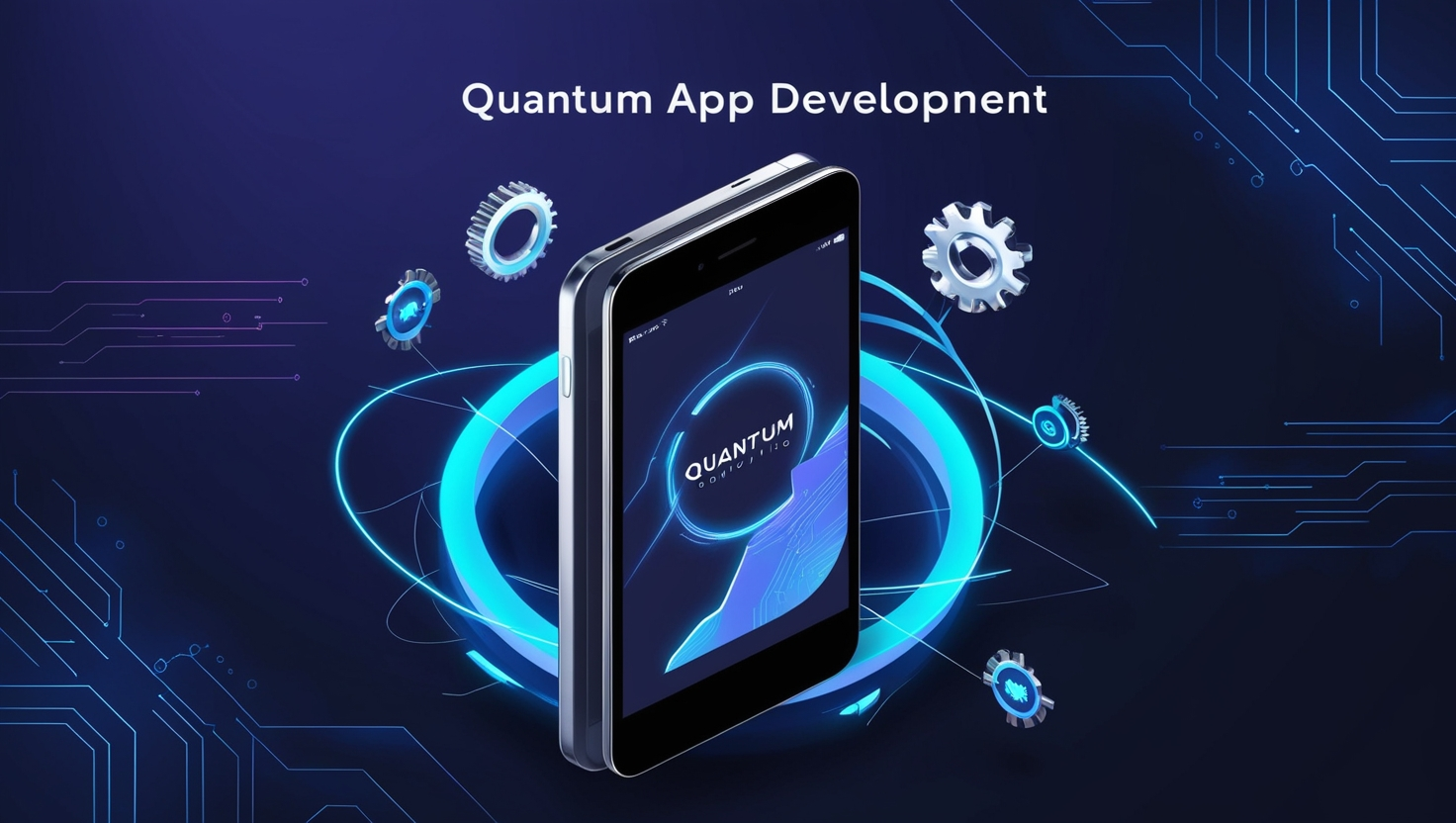Quantum app development is one of the most recent trends in advanced technologies that would allow us to obtain the solutions to the problems that ordinary computers would be incapable of solving in an efficient manner. Quantum computing can open up a range of new paradigms to such industries as health care, finance, cyber security, and artificial intelligence. The article will highlight the principles of quantum app development, the difficulties associated with it, the tools available, the areas of application, and the contribution of cities like Boston to a fast-expanding quantum ecosystem. Furthermore, it is important to highlight how quantum application development solutions can give an edge to developers in changing international trends in quantum technology.
Introduction to Quantum App Development
Quantum application development is the process of developing software applications that take advantage of quantum computers. Unlike traditional computers, where we use bits (0 or 1) to represent information, quantum computers are so-called quantum bits or qubits instead. Superposition and entanglement, which are quantum phenomena, allow these qubits to occupy more than one state at once. This ability enables them to complete intricate computations considerably more quickly than conventional systems.
Systems for developing applications for quantum computers contain a unique aspect specifically designed for use in quantum hardware and algorithms which are based on qubits. Making use of these qubits allows the application to process great amounts of data simultaneously. Furthermore, it allows new horizons to solve problems that were ignored by classical computers- huge amounts of optimization calculations, enormous simulations, and complex coding.
Key Applications of Quantum App Development
Because of the unique advantages of quantum computers over classical in certain areas, quantum state computing promises to transform countless industries. Some of the most exciting quantum application development applications include:
1. Monomaniacal Focus on Optimization Problems
Due to their versatile design, quantum state application development systems can easily be able to solve optimization problems in a more sensible period of time and more accurately. Some examples include systems for Effective supply chain management, logistics, as well as route optimization to optimize a wide range of routes during distribution services. By leveraging Quantum computing, solutions can be able to tackle a wide array of possibilities at the same time enabling an astronomical uptick in the speed where decisions can be made and resources allocated.
2. Drug Discovery and Healthcare
By depicting an unrivaled accuracy into molecular interaction, quantum computers can significantly augment the capabilities of drug discovery and research. Other applications of quantum app development are already present such as simulating biological interactions to fasten the process of creating effective drugs and other medical devices.
Learn more About Quantum Computing for Healthcare Applications
3. Cryptography and Cybersecurity
The advancement of Quantum cryptography has a revolutionary edge over the classical ways over the restriction of the encryption and codes used in the transmission of information. The ideal solution is the use of quantum application development solutions that have the quantum computing key distribution. quantum computing systems, on the other hand, can provide security protocols that have extremely high factors of precision.
4. Artificial Intelligence and Machine Learning
While AI and machine learning may not fully disappear, quantum computing might replace many of their peripherals and applications. A strong proof of this is the quantum computing apps that are concerned with the time attributed to the training of machine learning models. This might lead to a better, cheaper in terms of costs, resources and time solutions that span image analysis, predictive models and natural language processing.
5. Climate Modeling and Financial Forecasting
Models that take advantage of Quantum computing are likely to be beneficial in a number of sectors including climate modeling and financial forecasting because of its high performance and capability of handling complex calculations coupled with extensive data sets. These quantum applications are likely to enable businesses and researchers to make better predictions by quickly accessing and processing large amounts of data.

Tools for Quantum App Development
Creating quantum software is impossible without depending on certain tools and platforms designed according to the requirements of quantum computing. Below is the list of quantum application development tools that are some of the most frequently mentioned in the industry, Qiskit (IBM), Cirq (Google), and Microsoft Quantum Development Kit
1. Qiskit (IBM)
Qiskit is owned by IBM, it is a software development kit that integrates well with what IBM offers, which is information technology Qiskit is in fact a quantum programming building block with Qiskit being able to run in simulators and actual quantum devices, developers won’t have a hard time looking for an interface that isn’t too complicated for most programming languages.
2. Cirq (Google)
Google has developed the Cirq Quantum library, a software that is sufficient for creating, modeling, and instructing quantum Circuits. Cirq was made for NISQ devices, which makes it easier for developers to conduct experiments on quantum algorithms before putting it on actual quantum hardware.
3. Microsoft Quantum Development Kit
The toolkit provides developers with a well-defined and structured environment with tools such as Q# coding language and simulators. It is built so developers can utilize it to as a way to integrate with already existing systems and build quantum applications for them.
4. D-Wave’s Ocean SDK
The Ocean SDK offered by D-Wave features tools that enable the user to create programs for quantum annealers. This tool kit is specifically useful in optimization tasks and has a plethora of tools to assist a developer in coming up with viable quantum algorithms.
These tools are a requirement for practical quantum app developers. They help enable quantum computing with applications in solving scalable and practical quantum software.

Obstacles to Quantum App Development
Quantum computing is very promising but there are several obstacles faced when trying to get quantum applications built, these include:
1. Skill Gap
Quantum computing is pegged on advanced physics and also cutting edge computer science and that forms a very large skill gap. There are plenty of developers including Boston mobile app developers that lack the basic understanding of quantum theory to utilize quantum technologies properly. The scarcity of skilled workers makes it hard for firms to put together teams that can make quantum applications.
2. Hardware Limitations
To no one’s surprise, the evolution of quantum hardware hasn’t come easy, quantum computers are plagued with several limitations. This includes possible constriction with qubits since they’re bound to highly sensitive environmental disruptions which are crucial for lowering error rates and for ensuring coherence needed for reliable quantum applications. There is a need for quantum development software to take these hardware aspects into account for better functioning of quantum applications.
3. Integration with Classical Systems
It must be emphasized, quantum systems are to only work in collaboration with classical systems and not render it useless, the intention was not to disregard classical computing systems. In order to develop practical quantum applications, one may need to think of ways to allow both quantum and classical systems to interact with each other, because this is very important for communication. Such integration is important for those industries that are targeting hybrid solutions for computing.
3. Integration with Classical Systems
It must be emphasized, quantum systems are to only work in collaboration with classical systems and not render it useless, the intention was not to disregard classical computing systems. In order to develop practical quantum applications, one may need to think of ways to allow both quantum and classical systems to interact with each other, because this is very important for communication. Such integration is important for those industries that are targeting hybrid solutions for computing.
4. Cost and Accessibility
Given the astronomical cost associated with accessing quantum hardware and app development services, there is little hope for smaller businesses to climb up the ladder to success. Be it buying quantum infrastructure, or simply obtaining it via cloud services, the majority of the resources needed for quantum computing are expensive. That’s why only a few organizations, such as us who create quantum applications, have enough money to spend on these technologies.
The Future of Quantum App Development
There is a bright future for the development of quantum applications, which has great potential for growth and innovation. With better quantum hardware and more advanced algorithms being developed, quantum application development systems will be more copious and expandable in the future.
1. Wider Adoption
Increased open source quantum application development tools will also be in the market making quantum technologies much easier to access for developers even as quantum application development gets a foothold, this will make it possible for developers everywhere to create quantum application development frameworks without having to rely on costly infrastructure.
2. New Business Models
The ability to quickly solve complex optimization problems will create opportunities for new types of business. Developers in Boston and elsewhere are exploring possibilities of developing quantum application solutions for optimizing supply chains, logistics and other industries.
3. AI and Machine Learning Breakthroughs
With the use of quantum computation, AI and machine learning will be able to minimize the required time during the training stage greatly improving the models, this will unleash a plethora of opportunities for both businesses and researchers.

Conclusion
Quantum computing application development is an intriguing emerging area that is set to revolutionize industries worldwide. Given its exceptional capability to solve intricate problems at a faster rate than classical computing, quantum computing is expected to bring about significant advancements in optimization, algorithms, security, creation of drugs, and any form of computer intelligence. Regardless of the hurdles such as lack of hardware infrastructure and qualified development personnel, the prospects of quantum application development solutions remain very promising.
For the developers wishing to take part in this advancement, using quantum application development tools and platforms will be an asset to them. As quantum applications development service accelerates in such cities as Boston, scope for invention and development will be limitless. It should be an opportunity to look for quantum applications development software, open source quantum applications development solutions, or quantum applications development partners because the future of computing is here.
FAQs
What is quantum software?
In essence, quantum software is a collection of programs and algorithms for quantum computers. It realizes quantum phenomena such as superposition and entanglement to obtain solutions to computations which are otherwise easier on a quantum computer but impossible for classical computer to execute in a reasonable time.
Can quantum computers run programs?
Quantum computers execute program instructions written in specific quantum algorithms targeted at using quantum mechanics for solving problems faster than classical approaches.
What is quantum in the IT industry?
In Information Technology, the term quantum indicates the practical use of quantum-computing technologies for solving a number of optimization tasks, quantum-resistant communications based on quantum cryptography, and the development of algorithms.
What software is used for quantum computing?
Among the quantum computing programs are: International Business Machines’ Qiskit, Google’s Cirq, Microsoft’s Q#, Rigetti’s Forest and other similar software, which assist in developing and executing quantum algorithms on real or simulated quantum devices.
Can quantum computers create AI?
Yes, so considered super computer machines can develop AI thanks to the possibility to work with large amounts of data and make far more complicated calculations, as well as other intelligence boosting tasks such as machine learning and optimization.
What’s the difference between quantum and classical app?
Quantum systems adopt the concept of superposition because they use quantum bits which can reside, or exist, in multiple states at the same time. Thus, superposition opens up possibilities for unprecedented parallel processing. This makes it possible for quantum systems to arrive at solutions to specific problems in a much shorter time frame than classical computers.

